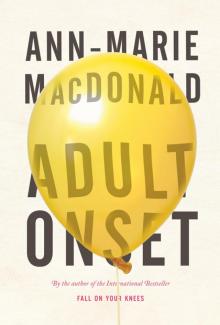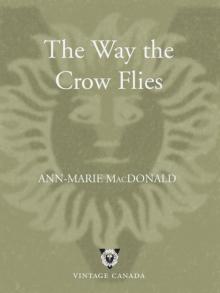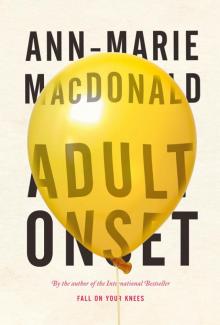- Home
- Ann-Marie MacDonald
Way the Crow Flies Page 3
Way the Crow Flies Read online
Page 3
He says to Mimi, “Sing it again, Missus.”
Farms, wide and prosperous, red barn roofs painted with family names, Irish, English, German, Dutch. This is the southern Ontario heartland. “The Golden Horseshoe …,” says Jack to his family. Bounded by three Great Lakes: to the south, Lake Erie and Lake Ontario; to the west, Lake Huron. And although on a map its shape resembles more the skull of a steer, Jack is correct in adding, “It’s also known as the Southern Ontario Triangle.” The two descriptions conflate for Madeleine and she pictures a glittering golden triangle on a map, their blue station wagon seen from high above, crawling across it.
“Like the Bermuda Triangle?” she asks.
Her parents exchange a smile. “Nope,” says her father.
Mike turns to her and mouths the word stunned.
Jack explains that in the Bermuda Triangle things are thought to disappear mysteriously, planes and boats vanishing without a trace. The Southern Ontario Triangle is just the opposite. It is packed with people—at least by comparison to the rest of Canada. There are factories and farms, the soil as rich as the cities; orchards of soft fruit down in the Niagara Peninsula and, spanning the whole, vast fields of corn, tobacco, beets, alfalfa; dairy cattle, horses, hogs and high finance. Windsor waves across the water to Detroit; General Motors, pension plans, let the good times roll off the assembly line. The U.S. is, in some places, a stone’s throw away, its branch plants springing up to cluster on the Canadian side, reinforcing bonds across the world’s longest undefended border. As President Kennedy said last year in Canada’s Parliament, “Those whom nature hath so joined together, let no man put asunder.” The best of both worlds.
“How many more miles, Dad?”
“A few. Just sit back and enjoy the scenery.”
Cutting a swath through fields and woodlots are massive marching steel towers. Follow those mighty X-men and they will lead you to Niagara Falls—twelve million gallons per minute to fuel turbines that never stop, the engine of this province and the north-eastern United States. Pure power carried by those columns of upreaching steel, high-voltage honour guard, girders of the golden triangle.
“Are we there yet?”
“Almost.”
This part of the world was one terminus on the Underground Railroad, bordering as it does Michigan and New York State. There are still farms around here run by descendants of slaves who made that journey. People pass by and see a black woman driving a tractor and wonder where she’s from. She’s from here.
A certain amount of smuggling still goes on back and forth across the border—things and, sometimes, people.
Toronto is “the big smoke,” and there are major tourist attractions like Niagara Falls, but at the heart of the Triangle sits the medium-size city of London. There are a lot of insurance companies there. Big American corporations have regional headquarters in London, and products destined for the entire North American market are tested first on the consumers in this area. The manufacturers must think there is something particularly normal about the Southern Ontario Triangle.
“Dad,” Madeleine asks, “why don’t they change Kitchener back to Berlin now that the war is over?”
“Both wars,” he replies, “especially the last one, are still very much in living memory.”
In living colour.
“Yeah, but Germany’s not our enemy now,” says Mike, “Russia is.”
“Right you are, Mike,” says Dad in his man-to-man voice, parade-square clipped, “though you don’t really want to say Russia. Russians are people like anyone else, we’re talking about the Soviets.”
Soviets. The word sounds like a difficult unit of measurement: If Joyce has three soviets and Johnny has twelve, how many soviets would they have if…. Madeleine doesn’t press the issue, but feels that Kitchener probably knows that Kitchener is not its real name. The name change makes it seem as though bright shiny Kitchener has an evil secret: “My name used to be Berlin. Heil Hitler.”
Dad clears his throat and continues, “There’s an old saying: ‘Those who do not remember history are doomed to repeat it.’”
Which is proof that, once your name is Berlin, you should keep it that way. But Madeleine says nothing. There is smart, and there is “being smart.”
There is a wall down the middle of the real Berlin now. It’s part of the Iron Curtain. Madeleine knows that it’s not a real curtain, but the Wall is real. Twenty-nine miles of barbed wire and concrete. The grown-ups say “when the Wall went up” as though it sprang up by magic overnight. “History in the making,” her father called it.
Before the Wall went up, the border ran down the middle of streets, through cemeteries and houses and apartment buildings and people’s beds. You could go to sleep in the U.S.S.R., roll over and wake up in the free world. You could shave as a Communist and breakfast as a free man. Maybe they could build a miniature wall through the middle of Kitchener if they changed its name back to Berlin. That’s not funny. Communism is not funny.
“Dad, are they going to blow up the earth?” she asks.
He answers with a laugh, as though it were the first he’d ever heard of the idea. “Who?” he asks.
“Are they going to press the button?”
“What button?” says Dad. What snake under the bed?
Mike says, “It’s not a button, it’s a metal switch and it takes dual keys, one for each guy, and one guy turns his key, then the other guy—”
“And the chances of that happening,” says Dad in his my-last-word-on-the-subject voice, “are virtually nil.”
“What’s ‘virtually’?” asks Madeleine.
“It means it might as well be zero.”
But it ain’t zero, is it, doc?
They drive in silence for a while.
“But what if they did press the button?” says Madeleine. “I mean, what if they did turn the keys? Would the earth blow up?”
“What are you worrying about that for?” He sounds a little offended. She feels somewhat ashamed, as though she has been rude. It’s rude to worry about the earth blowing up when your dad is right there in the front seat driving. After you’ve had ice cream and everything.
“Would your skin melt?” She didn’t mean to ask, it just slipped out. Picture your skin sliding off after it has melted. Nyah, pass me a wet-nap, doc.
“What makes you think that would happen?” He sounds incredulous, the way he does when she is afraid and he’s comforting her—as if hers were the most groundless fear in the world. It is comforting. Except when it comes to melted skin.
“I saw a picture,” she says.
“Where?”
“In a magazine. Their skin was melted.”
“She’s talking about the Japs,” explains Mike.
His father corrects him. “Don’t say Japs, Mike, say Japanese.”
“Would it melt?” asks Madeleine.
“Can we talk about something nice, au nom du Seigneur?” says Mimi, coming to the end of her tether. “Think nice thoughts, Madeleine, think about what you’re going to wear the first day of your new school.”
Melted skin.
Maman lights a cigarette. They drive in silence. Refreshing Cameo Menthol.
After a while, Madeleine glances at Mike. He has fallen asleep. Maybe when he wakes up he’ll play I Spy with her. If she doesn’t act like a baby. Or a girl. They used to play together a lot, and shared baths when they were little. She recalls vivid fragments—boats bobbing, bubbles escaping from sinking ducks, “Mayday, come in, Coast Guard.” She remembers sucking delicious soapy water from the face cloth until he grabbed it from her: “No, Madeleine, c’est sale!”
A bit of drool at the corner of his mouth makes him look younger, less remote. Madeleine’s throat feels sore—she is tempted to poke him, make him mad at her, then she might stop feeling sad for no reason.
Welcome to Lucan….
They are standing in an old country churchyard. Not old for Europe, old for Canada. Long grass obscures the grav
estones, many of which have keeled over. One monument stands out. Four-sided and taller than the rest, still upright but chipped in places. Five names are chiselled on its sides, each name ending in “Donnelly.” They were born on different dates, but they all died on the same day: FEB. 4, 1880. And after each name, etched in stone, is the word “Murdered.”
The Donnellys were Irish. Jack tells the story of how they and their neighbours brought their feud with them from the old country to the new. “You have to ask yourself why,” he says, “with all this space in Canada, they chose to live right next door all over again.” There isn’t much to the story. Most of it is written right there in the stone. Murdered Murdered Murdered Murdered Murdered.
Mimi calls from the car, “Madeleine, come, we’re going, reviens au car.” But Madeleine lingers. “How did they murder them?” she asks her father.
“They came in the night and broke in.”
“How?”
“With axes,” says Mike.
“Come on, kids, let’s go,” says Jack, heading for the car.
“Did they get the people who did it?” she asks, transfixed before the stone.
No, they never did.
“Are they still out there?”
No, I told you, it all happened a long time ago.
“I don’t know why you stopped here, Jack,” says Mimi, leading her daughter away by the hand. “She’s going to have des cauchemars.”
“No I won’t,” says Madeleine, stung by the implication that looking at an old gravestone might give her nightmares—she isn’t a baby. “I’m just very interested in history.”
Jack chuckles and Mimi says, “She’s a McCarthy, that one.” Madeleine wonders why anyone would want to be anything else.
Don’t look for that monument nowadays. It was removed years ago, because too many tourists left with fragments of the stone. The McCarthys don’t do that. They simply look and reflect, as is their custom. Rarely do they seek out “attractions”—mini-putt, go-carts—despite Mike’s pleas and Madeleine’s yearnings. Not only are those pursuits “tacky,” but the best things in life are free. The wonders of nature, the architecture of Europe. Your imagination is the best entertainment of all, writing is the greatest technology known to man, and your teeth are more precious than pearls so look after them. “‘Eat an apple every day, take a nap at three, take good care of yourself, you belong to me’—come on, les enfants, chantez avec maman….” And Mike does.
Way up in the sky the moon is visible, a pale wafer. We intend to get there before the decade is out, President Kennedy has pledged it. Madeleine’s father has predicted that when she and Mike are grown up, people will take a rocket to the moon as easily as flying to Europe. They were in Germany when Yuri Gagarin became the first man in space. Everyone was glued to the radio—the American Forces network with Walter Cronkite, “the voice of space.” The Russians are beating us in space because Communists force their children to study nothing but arithmetic. Madeleine closes her eyes and sees the imprint of the moon against her lids. At least the Russians sent a man up there that time and not a dog, the way they did with Sputnik. That dog smothered.
“What was that dog’s name?”
“What dog?” asks her father.
Think nice thoughts. “Nothing.”
When John Glenn orbited the earth last February, the principal played the radio over the PA system and the whole school listened to the countdown. They cheered, and when Lieutenant Colonel Glenn returned safely to earth, the principal announced, “This is an historic day for freedom-loving peoples everywhere.”
It is important to beat the Russians to the moon before they can send any more innocent dogs up there.
“How many more miles, Dad?” When Mike asks, it sounds like a question posed out of pure interest in maps and triangulated distances. When Madeleine asks, it sounds like whining. There is little she can do about this.
“Take a look at the map there, Mike,” says her father in his man-to-man voice. It is a different voice from the one he uses with her. The man-to-man voice makes Mike seem important, which annoys Madeleine, but there is also a note in it that makes her worry that Mike may be about to get in trouble for something even though he hasn’t done anything.
“Voici la mappe, Michel.” Her mother turns and hands it to Mike.
“Merci, maman.” He shakes out the map importantly, peers at it, then: “I estimate arrival at 1700 hours.”
“What time is that, Mike?” Madeleine asks.
“It’s Zulu time.”
“Mike, quit it.”
“Five P.M. to civilians,” he says.
“You’re a civilian too,” says Madeleine.
“Not for long.”
“Yes, you’re only eleven, you can’t join till you’re twenty-one.”
“Dad, you can join the army at eighteen, can’t you?”
“Technically, yes, Mike, but then who in his right mind would want to join the army?”
“I mean the air force.”
“Well, during the war….”
During the war. When her father starts this way, it’s clear he’s going to talk for a while, and probably tell them things he has told them before, but somehow that’s the best kind of story. Madeleine leans back and gazes out the window, the better to picture it all.
But Mike interrupts, “Yeah, but what about now?”
“Well, now I think it’s eighteen,” says Dad, “but during the war …”
Mike listens, chin perched on the backrest of the front seat. Mimi strokes his cheek, his hair. Mike allows himself to be petted and Madeleine wonders how he has managed to fool their mother into thinking he is pettable. Like a fierce dog with bone-hard muscles that can only be patted by its owner, and its owner thinks it’s fluffy.
“… you had fellas as young as sixteen training as pilots—they lied about their age, you had to be seventeen and a half….” Her father was training at seventeen but he wasn’t in the war. There was a crash. Madeleine closes her eyes and pictures his aircraft.
But Mike interrupts again. “Could I train at eighteen?”
“Tell you what, Mike, when we get to the station, I’ll ask around. I know there’s a civilian flying club and I don’t see why we shouldn’t get you up in a light aircraft before too long, eh?”
“Wow, Dad!” Mike punches his thighs. “Man oh man!”
Mimi reaches over and caresses the back of her husband’s neck and he returns a casual glance that says, “No big deal,” but really means “I love you.”
Madeleine is embarrassed. It is as though she were suddenly looking through a door that someone ought to have closed. Mike seems not to notice that sort of thing.
“Dad,” says Madeleine, “tell the story of the crash again.”
“Yeah, Dad,” says Mike.
“How about you settle back and enjoy the scenery, and when we get there I’ll show you exactly where it happened.”
Mimi sings, “O Mein Papa.”
Mike allows Madeleine to put her feet on his side of the seat. They sing for miles, until they forget where they are going, until they forget where they have been, and the drive becomes a dream, and that’s what a drive could be back then.
Welcome to Paris, Welcome to Brussels, Welcome to Dublin, New Hamburg, Damascus, Welcome to Neustadt and Stratford, and London…. Welcome to Ontario.
So many unseen companions in this countryside, so many layers of lives. A collective memory has risen from the land and settled over the Triangle like a cumulus cloud. Memory breeds memory, draws it out of new arrivals, takes it in. The soil so rich, water so abundant, the bounty so green; it has absorbed us many times over, then breathed everything out again, so that the very air is made of memory. Memory falls in the rain. You drink memory. In winter you make snow angels out of memory.
Twenty-five miles north of London lies the Royal Canadian Air Force Station at Centralia. RCAF Centralia. Don’t look for it now, it has lost its memory. A temporary place, for temporary
people, it was constructed so that memory would not adhere, but slip away like an egg from a pan. Constructed to resist time.
The station is named for the nearby village of Centralia, but there the resemblance ends. The village is old and getting older. Gardens change in the village, shops go in and out of business, houses age, are altered, people are born, grow up and die there. But everything about an air force station is new. And it will stay that way for its entire operational life. Each house, each building will be freshly painted in the same colours they have always had, the cadets who jog across the parade square will always be young and about to get their wings. The families in the PMQs will always seem like the first families to move in, they will always have young children of about the same age. Only the trees will change, grow. Like reruns on television, an air force station never grows old. It remains in the present. Until the last flypast. Then it is demobilized, decommissioned, deconsecrated. It is sold off and all the aging, the buildup of time that was never apparent, will suddenly be upon it. It will fade like the face of an old child. Weeds, peeling paint, decaying big-eyed bungalows….
But until that happens, the present tense will reign. And were a wanderer to return after being lost in time, she could walk straight up to her old house and recognize it. Open the door and expect to see Mum with a pan of cookies—“I’ve laid out your Brownie uniform on the bed, sweetheart, where have you been?”
No, this part of the world is not the Bermuda Triangle. But from time to time people do come here in order to disappear.
WELCOME TO CENTRALIA
I know it sounds a bit bizarre,
but in Camelot, that’s how conditions are.
Camelot, Lerner and Loewe, 1960

 Adult Onset
Adult Onset Belle Moral: A Natural History
Belle Moral: A Natural History The Way the Crow Flies
The Way the Crow Flies SSC (2012) Adult Onset
SSC (2012) Adult Onset